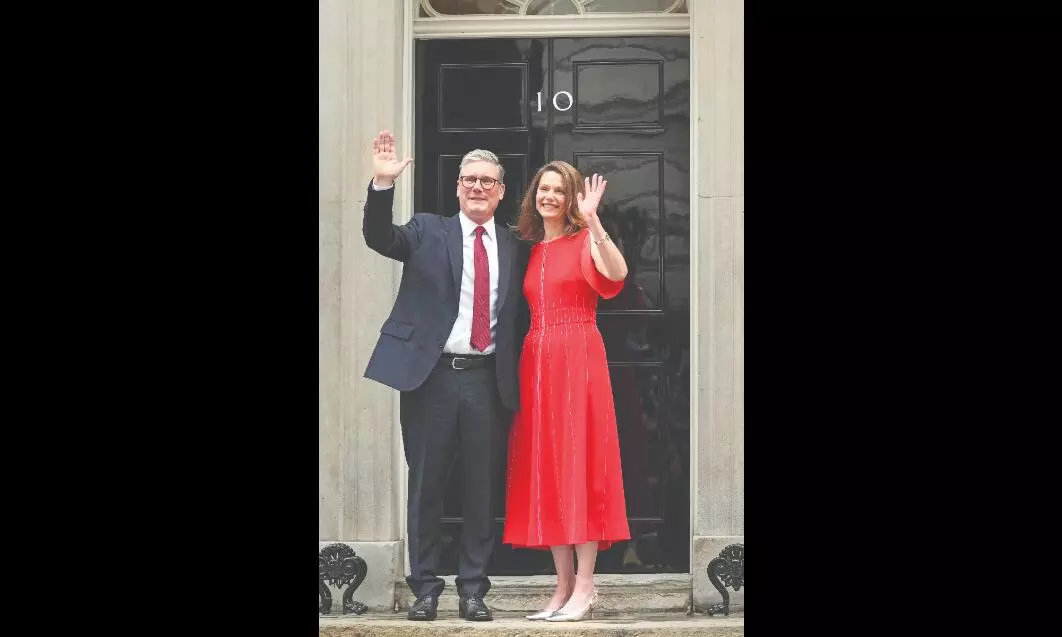Labour’s landslide: Starmer takes helm as UK’s 58th PM

London: Keir Starmer has taken office as the United Kingdom’s 58th Prime Minister after his Labour Party secured a resounding victory in a general election that dealt a devastating blow to the Rishi Sunak-led Conservatives. The results mark a decisive end to 14 years of Conservative rule and the worst electoral defeat in the party’s history.
Starmer, 61, assumed the premiership following his audience with King Charles III at Buckingham Palace, succeeding Sunak after the latter’s meeting with the monarch. The Labour Party secured a commanding 412 seats in the 650-member House of Commons, marking a significant increase of 211 seats since the previous election in 2019. In contrast, the Conservatives plummeted to just 121 seats, a staggering loss of 250 seats.
In his inaugural address outside 10 Downing Street, Starmer declared: “Our country has voted decisively for change, for national renewal, and a return of politics for public service.” He acknowledged the daunting challenges ahead, emphasising that rebuilding the nation would require immediate and sustained effort, not merely symbolic gestures.
“We must bridge the gap between sacrifice and service, restoring hope and belief in a better future,” Starmer asserted, underscoring the need for trust-building actions over rhetoric.
The new Prime Minister paid tribute to his predecessor, Rishi Sunak, for his leadership, particularly highlighting Sunak’s historic role as the first British Asian Prime Minister. Sunak, who assumed charge as UK Prime Minister in October 2022, said he will step down as the leader of the Conservative Party, taking “responsibility” for its debacle in the general election.
“I have heard your anger and disappointment, and I accept full responsibility for this loss,” Sunak stated in his farewell speech, vowing to continue serving his constituents with dedication.
Meanwhile, Starmer named Rachel Reeves as Britain’s first female Finance Minister and Angela Rayner as his deputy on Friday as he began putting together the team that will help him try to deliver on a promise to rebuild the country. Starmer appointed David Lammy as Britain’s new Foreign Minister and John Healey as Defence Minister, while Yvette Cooper became Interior Minister, known as Home Secretary, overseeing domestic security and policing.
A record number of around 28 Indian-origin members of Parliament have been elected to the House of Commons in the UK’s general election.
While many of his Cabinet colleagues were defeated in the election held on Thursday, Sunak, the country’s first British Indian prime minister comfortably held on to his own Richmond and Northallerton seat in northern England with 23,059 votes.
Other prominent British Indian Tories holding on to their seats included former home
secretaries, Suella Braverman and Priti Patel, as did Sunak’s Goan-origin Cabinet ally Claire Coutinho.
Reflective of the overall election results tally, it was the Labour Party that saw the maximum number of winning Indian diaspora candidates, starting with party veterans such as Seema Malhotra – who held on to her Feltham and Heston constituency with a comfortable margin. Goan-origin Valerie Vaz, sister of Keith Vaz, won in Walsall and Bloxwich, as did Lisa Nandy with a big margin in Wigan.
British Sikh MPs Preet Kaur Gill and Tanmanjeet Singh Dhesi won back their seats for Labour in Birmingham Edgbaston and Slough respectively. Navendu Mishra (Stockport) and Nadia Whittome (Nottingham East) were among the other Labour MPs re-elected with convincing majorities. It was among the newcomers that British Indians made a big mark for the Labour Party, with Jas Athwal (Ilford South), Baggy Shanker (Derby South), Satvir Kaur (Southampton
Test), Harpreet Uppal (Huddersfield), Warinder Juss (Wolverhampton West), Gurinder Josan (Smethwick), Kanishka Narayan (Vale of Glamorgan), Sonia Kumar (Dudley), Sureena Brackenbridge (Wolverhampton North East), Kirith Entwistle (Bolton North East), Jeevun Sandher (Loughborough) and Sojan Joseph (Ashford) among those set to take their seats in Parliament next week.
For the Liberal Democrats, who had a good election all around gaining over 60 seats, Munira Wilson won back her Twickenham constituency. Two Independent candidates with ancestral roots in India, Shockat Adam Patel (Leicester South) and Iqbal Mohamed (Dewsbury and Batley) registered decisive wins in the pro-Palestine campaigning. While the former unseated a Labour Cabinet frontliner Jonathan Ashworth, the latter bagged more than 40 per cent of the votes.
The election also saw significant developments across party lines, including Nigel Farage’s Reform UK securing four seats, signalling a shifting landscape in British politics.



